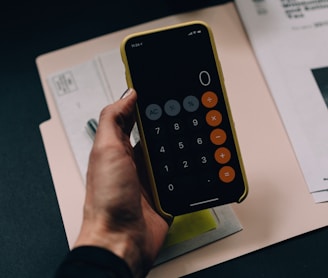10 Tips for Sticking to Your Budget: Tools and Strategies for Financial Success
Creating a budget is an essential first step in achieving financial stability, but sticking to that budget can be challenging. In this article, we’ll share 10 tips and strategies to help you stay on track and reach your financial goals. From using budgeting tools to making small changes in your daily routine, we’ve got you covered.
BUDGET
5/9/20233 min read


Introduction
Managing personal finances effectively is crucial for achieving financial success. One of the key aspects of financial management is sticking to a budget. However, this can be challenging without the right tools and strategies in place. In this article, we will explore ten useful tips that can help you stay on track with your budget and achieve your financial goals.
1. Create a Realistic Budget
To start your budgeting journey, it is essential to create a realistic budget based on your income, expenses, and financial goals. Consider your fixed expenses, such as rent, utilities, and loan payments, as well as variable expenses like groceries and entertainment. Set aside a portion of your income for savings and emergency funds.
2. Track Your Expenses
Keeping track of your expenses is crucial for understanding where your money is going. Use a spreadsheet, budgeting app, or dedicated expense tracker to monitor your spending. Categorize your expenses to identify areas where you can cut back or make adjustments.
3. Prioritize Your Spending
When you have a limited budget, it's important to prioritize your spending. Differentiate between needs and wants. Allocate more funds to essential expenses like housing, food, and transportation while reducing discretionary spending on non-essential items.
4. Automate Your Savings
Saving money consistently is easier when you automate the process. Set up automatic transfers from your checking account to a dedicated savings account. This way, you won't be tempted to spend the money before saving it.
5. Use Envelope Budgeting
Envelope budgeting is a tangible and visual way to manage your finances. Assign specific envelopes for different spending categories, such as groceries, entertainment, and transportation. Put the allocated amount of cash in each envelope at the beginning of the month. Once an envelope is empty, you cannot spend any more in that category until the next month.
6. Avoid Impulse Purchases
Impulse purchases can derail your budget quickly. Before making a purchase, especially for non-essential items, give yourself a cooling-off period. Delaying the purchase allows you to evaluate whether it aligns with your priorities and budget.
7. Embrace Cash-Based Transactions
Using cash for your transactions can help you become more aware of your spending. Withdraw the amount you have allocated for a specific expense category and use only cash for those purchases. It provides a tangible representation of your budget and helps you avoid overspending.
8. Utilize Budgeting Apps
In the digital age, numerous budgeting apps are available to assist you in managing your finances. These apps allow you to track expenses, set financial goals, and receive notifications about upcoming bills or overspending. Explore options like Mint, YNAB (You Need a Budget), or PocketGuard to find one that suits your needs.
9. Negotiate and Seek Discounts
Don't be afraid to negotiate prices or seek discounts when making significant purchases or subscribing to services. Many companies are willing to offer discounts or promotions if you simply ask. Research and compare prices before making a decision.
10. Review and Adjust Regularly
Your financial situation and goals may change over time, so it's crucial to review and adjust your budget regularly. Assess your progress, make necessary modifications, and ensure that your budget remains aligned with your financial objectives.
Conclusion
Sticking to a budget is a fundamental step toward achieving financial success. By following these ten tips, you can establish healthy financial habits and gain control over your money. Remember, financial discipline and consistency are key. Embrace the tools and strategies that work best for you, and stay committed to your budgeting goals.
FAQs
1. How long does it take to create a realistic budget? Creating a realistic budget depends on your circumstances and the time you allocate to the process. It can take a few hours to gather the necessary information and set up a budget, but regular maintenance and adjustments are required.
2. Are budgeting apps secure? Budgeting apps prioritize the security of your financial information. Reputable apps use encryption and other security measures to protect your data. However, it's essential to choose a trusted app and follow best practices to safeguard your personal information.
3. Can I adjust my budget during the month? Yes, you can adjust your budget during the month if necessary. Unexpected expenses or changes in income may require modifications to your spending plan. Flexibility is key to maintaining a realistic and effective budget.
4. Should I include savings in my budget? Absolutely! Saving should be an integral part of your budget. Allocate a specific portion of your income for savings and treat it as an expense. Regular saving helps build an emergency fund and work towards long-term financial goals.
5. What should I do if I overspend in a particular category? If you overspend in a specific category, you may need to adjust other areas of your budget to compensate. Look for opportunities to reduce spending in other discretionary categories or find ways to increase your income temporarily to cover the overspending.
